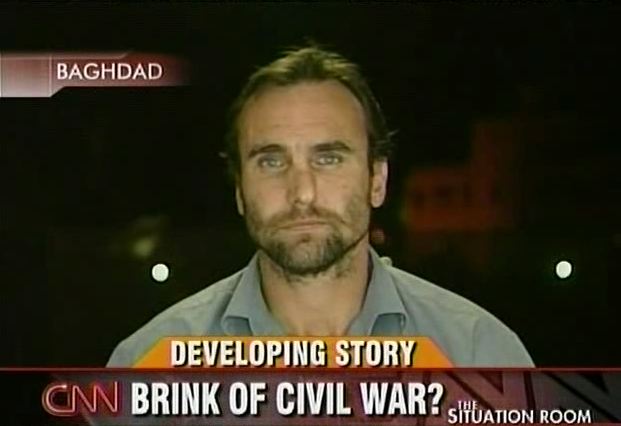TSR: "The fourth Ramadan offensive"

Click photo to play
Length: 5:41
WOLF BLITZER: Just hours ago, the United Nations Secretary General Kofi Annan warned that Iraq could be on the brink of a full-scale civil war. Annan says Iraq and its leaders are at a crossroads.
(BEGIN VIDEO CLIP)
KOFI ANNAN, UN SECRETARY GENERAL: If they can address the needs and common interests of all Iraqis, the promise of peace and prosperity is still within reach. But if current patterns of alienation and violence persist much longer, there is a grave danger that the Iraqi state will break down possibly in the midst of a full- scale civil war.
(END VIDEO CLIP)
BLITZER: The comments come on a day where violence around the country claimed more than 40 lives. More of those half of those fatalities came in a pair of suicide bombings in Ramadi and the northern Iraqi city of Tal Afar. CNN correspondent Michael Ware is in Baghdad.
(BEGIN VIDEOTAPE)
BLITZER: Joining us now from Baghdad, our correspondent Michael Ware. Michael, we're getting very close to the start of Ramadan, what, only about a week or so off. What if any impact do you sense this will have on the insurgency, the sectarian violence?
MICHAEL WARE, CNN CORRESPONDENT: Well, Wolf, what U.S. military intelligence is expecting and what all of us who have been here long enough are waiting for is the fourth Ramadan offensive. What has always been seen in Ramadan past is that the insurgency, particularly the extremist Sunni religious groups, raise the tempo and the ferocity of their attacks. So the American military here on the ground is preparing for what it calls a significant spike in violence over Ramadan, Wolf.
BLITZER: And the whole nature of this spike -- when you say the U.S. military, presumably the Iraqi military, they're getting ready for it, how do they get ready for it? Aren't they doing everything already that they possibly can given their resources?
WARE: Well, yeah, the resources obviously are a huge factor. There's clearly not enough American and/or Iraqi troops to do the job that's ultimately needed to be done, be that here in the capital, let alone across the country itself.
But what we do see is that security procedures can be ratcheted up at least one or two more notches. There's normally imposed curfews, even more than we currently live under now. There can be the placement of additional check points. There can be increases in patrolling and operational tempos. Essentially, they try to close particularly the capital, but other hot spots down even further than they can normally sustain for any length of time -- Wolf?
BLITZER: You've spent a lot of time now in Iraq, over the years, since the war. You've been embedded with U.S. troops very recently. From your perspective, the big picture, is the insurgency and the sectarian violence getting more intense, more lethal, more dangerous or is this overall security situation, from the U.S. perspective, improving?
WARE: Wolf, there's absolutely no doubt about the answer to that question. This country is spiraling further and further into a cycle of both sectarian violence and insurgent violence. And most alarmingly about the nature of the insurgent violence is we're seeing al-Qaeda in Iraq take more and more ground within the insurgency itself. President Bush put Iraq front and center in the global war on terror. Well Osama bin Laden and his deputies have done the same. On the ground here, we're seeing al-Qaeda in Iraq, which actually represents only a small fraction of the numbers on the ground but increasing its influence and in fact its numbers -- Wolf?
BLITZER: And you know a lot about the insurgency, the al-Qaeda operation in Iraq right now. Give us a little flavor of what's happening?
WARE: What's happening is that we're seeing al-Qaeda maintain its intensity. I mean, it's still the most well-funded organization out there. It's still the best structured. It still maintains the best secrecy or operational security. And it still has the most daring, most lethal, most unforgiving and most headline capturing or sensational tactics.
They have an ideology and a platform that the rest of the insurgency lacks. I mean, we've heard time and time again from the Baathists and the nationalist insurgencies about their attempts to develop a political front.
Well, we have seen that fall over repeatedly. Al-Qaeda does not lack that, so we're seeing them gain even further momentum -- even in the wake of their death of its leader Abu Musab al-Zarqawi -- among the rest of the insurgency. We're seeing normal Iraqi insurgents, if there is such a thing, people who consider themselves secular nationalists being herded towards al-Qaeda because of the pressure being put on their groups by the American army. But also by this sectarian strife and what they see is the imposition by America of a pro-Iranian government. As far as they see it, they are being left with no choice but be pushed to the extreme. Wolf?
(END VIDEOTAPE)
BLITZER: Michael Ware reporting for us from Baghdad.
